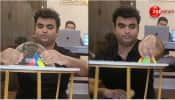Phnom Penh: Pol Pot`s close confederates cannot solely blame their late leader for the atrocities that took place under Cambodia`s Khmer Rouge regime, a prosecutor at the country`s UN-backed genocide tribunal said on Tuesday.
Andrew Cayley said that like Pol Pot, the three aging former members of the regime now on trial exercised life-and-death authority over Cambodia while in power in 1975-79.
"The accused cannot credibly claim they did not know and had no control over the crimes that occurred" when the group ruled what they called Democratic Kampuchea, he said.
An estimated 1.7 million people died of execution, starvation, exhaustion or lack of medical care as a result of the Khmer Rouge`s radical policies, which sought to create a pure agrarian socialist society.
Cayley was speaking on the trial`s second day, continuing the prosecution`s opening statement. On Monday, prosecutors related a litany of horrors, large and small, recalling how the Khmer Rouge sought to crush not just all its enemies, but seemingly the human spirit.
Most of the population were forced to work on giant rural communes and deprived of any sort of private life. Forced marriages took the place of love, and dissenters were dispatched to the so-called `killing fields’.
"These crimes were the result of an organised plan developed by the accused and other leaders and systematically implemented" by the Khmer Rouge military and central and regional government bodies, Cayley charged. "They cannot be blamed solely on Pol Pot as some of the accused may try."
The defendants are 85-year-old Nuon Chea, the Khmer Rouge`s chief ideologist and No 2 leader; 80-year-old Khieu Samphan, an ex-head of state; and 86-year-old Ieng Sary, the former foreign minister. All three avow their innocence.
A fourth defendant, 79-year-old Ieng Thirith, was ruled unfit to stand trial last week because she has Alzheimer`s disease. Ieng Sary`s wife was the regime`s minister for social affairs. She remains detained pending a court decision on prosecutors` appeal against her unconditional release.
The charges against the surviving inner circle of the communist movement include crimes against humanity, genocide, religious persecution, homicide and torture. Pol Pot died in 1998 in the jungle while a prisoner of his own comrades.
The defendants are old and infirm, and there are fears they won`t live long enough for justice to be done.
Michael Karnavas, one of the lawyers for Ieng Sary, asked on Tuesday that his client be allowed to follow proceedings from a special room outside the courtroom chamber in order to ease the physical burden on him. Judge Nil Non denied the request, as he did with a previous appeal on Monday, saying it was important for all the defendants to be present for the prosecution`s statement.
On Monday, Chea Leang, Cambodian co-prosecutor, recalled for the court the brutalities of Khmer Rouge rule, beginning on April 17, 1975, when they captured Phnom Penh to end a bitter five-year civil war. They immediately began the forced evacuation to the countryside of the estimated one million people who had sheltered in the capital.
She recounted the new social order established by the group: an all-enveloping system of forced labour, with personal property banned and religion, press and all personal freedoms abolished.
Pol Pot had led the Khmer Rouge from its clandestine revolutionary origins to open resistance after a 1970 coup installed a pro-American government and dragged Cambodia directly into the maelstrom of the Vietnam War.
When the Khmer Rouge took power in 1975, they all but sealed off the country to the outside world. Intellectuals, entrepreneurs and anyone considered a threat were imprisoned, tortured and often executed.
Chea Leang insisted the evidence would show that the regime the defendants led "was one of the most brutal and horrific in modern history”.
Two-thirds of Cambodians today were not yet born when the communist group`s reign of terror ended in 1979.
The tribunal has split the indictments according to charge into separate trials to speed the proceedings. The current trial is considering charges involving the forced movement of people and crimes against humanity.
Even streamlined, the proceedings are likely to cover an enormous amount of ground, and there is no estimate of how long they will take. The defence is expected to respond to the prosecution`s statement on Wednesday, and actual testimony is slated to begin on December 05.
The tribunal, which was established in 2006, has tried just one case, convicting prison chief Kaing Guek Eav for war crimes, crimes against humanity and other offenses. His sentence was reduced to a 19-year term due to time served and other technicalities.
Bureau Report















